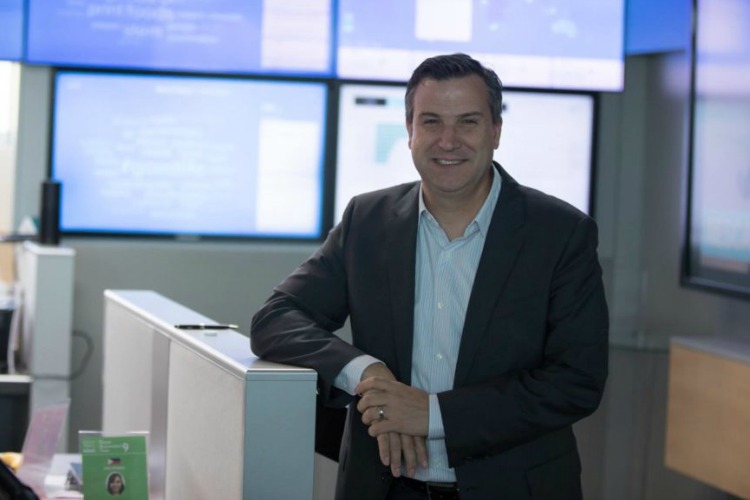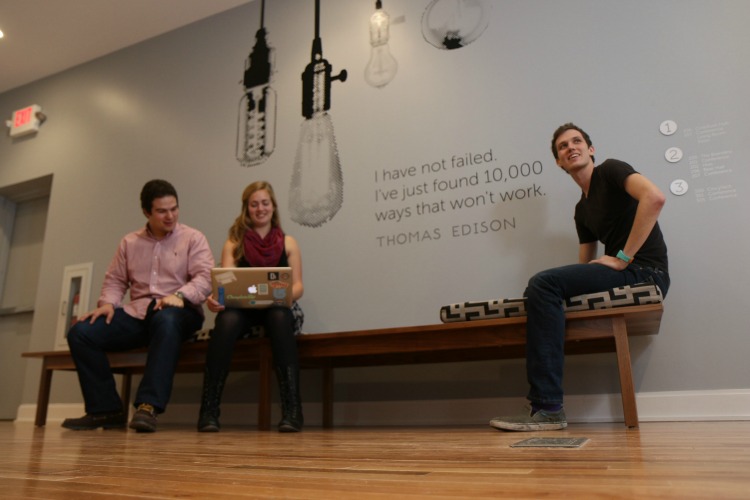The trust economy strives to bring loyalty and repeat customers to businesses
Pete Blackshaw and Cintrifuse, want to make Cincinnati the No. 1 tech startup hub in the Midwest.
Trust — in everything — is at an all-time low. Governments, politicians, news media, businesses, all suffer from the wariness and skepticism spawned by the seemingly nonstop headlines about fake news, massive data hacks, and product recalls.
That’s unfortunate, but does all this skepticism make for a business opportunity to explore? Is there a niche to be found developing products and technology that could help strengthen the trust of the American consumer in the brands they buy and the companies they buy from?
For Pete Blackshaw, the answer is a resounding “yes.” Blackshaw is three months into his role as chief executive officer of Cintrifuse, the Over-the-Rhine based startup engine. Cintrifuse’s stated mission is no less than to make Greater Cincinnati “the No. 1 tech startup hub in the Midwest.” But how to accomplish that?
One of Blackshaw’s ideas is to pursue something called “the trust economy.”
“You can’t just say we’re going to be the leading startup hub,” he says. “There has to be something people can believe in. A big one that I think we can lead and own is what I call the trust economy.”
It’s an opportunity that’s emerged in this era of distrust and cynicism. Brands that can generate trust will thrive, as trust brings loyalty and loyalty brings repeat customers.
And that’s a space that the Cincinnati startup economy can enter and lead, Blackshaw says.
He’s someone who spent most of his career working to figure out how brands can better engage with their consumers.
A native of Pasadena, Calif., and a graduate of University of California Santa Cruz (a school with no football team but with one of the great all-time mascots, the Banana Slugs), Blackshaw migrated to Cincinnati in 1995 to work for one of the world’s top consumer brand companies, Procter & Gamble.
Four years later, he ventured out on his own, launching Planet Feedback, a company that was an early player in the trust economy. The startup culled consumer feedback from letters, comments, social media, and other places on the web, dissected it, analyzed it, and provided it to major companies and brands eager to know what their consumers were thinking.
Here in Cincinnati, 2,300 miles from Silicon Valley, Blackshaw raised $31 million in venture capital to build his new company.
Planet Feedback ultimately became part of market research giant Nielsen. He worked for Nielsen (which has a major presence in Greater Cincinnati) for a time then moved his family to Switzerland to accept a job as global chief of digital marketing for Nestle, the world’s largest food and beverage company and purveyor of brands such as Gerber, Nescafe, Purina, and Carnation, as well as the Nestle brand.
After seven years in Switzerland, and enjoying its fringe benefits of skiing the Alps, he and his family moved back to Cincinnati, the place where he met his wife and where his children were born.
“I loved this city,” he says. “I always believed in this city’s potential.”
During his years away, Cincinnati’s Over-the-Rhine had been transformed into not only a destination for nightlife, but for creative businesses as well. And the startup environment had improved with commitments from some of the city’s big companies to support entrepreneurship. Part of that commitment was the creation of Cintrifuse, a nerve center of entrepreneurship that employs funding, connections, and mentorship to grow the startup culture here.
“When this job opened up, I saw a golden opportunity to make a positive contribution to a movement that was already under way,” Blackshaw says.
The notion of the trust economy, which he explored as far back as the Planet Feedback years, is one he believes Cintrifuse can encourage and help grow into viable businesses.
“The business world is in a massive trust crisis,” he says.
One of the highest profile failures of trust is Facebook. When the company founder is called on the carpet in front of Congress because Russian agents have exploited his product to undermine the American way of life … well, that’s a failure of trust on a massive scale.
“Consumers are struggling with who to trust,” he says. “Are there potential solutions that startups can deliver?”
“There are a dozen big businesses that have yet to be created that can bring greater trust and confidence to the digital economy,” he continues.
He cited the example of a small New York-based company called Moat, which has developed products to measure digital video traffic, an area of marketing analytics that’s fraught with inaccuracies and competing methods of measurement. Moat’s products are “trusted by” companies such as Unilever, The New York Times, Twitter, and Kellogg’s, according to its website.
Those are the kinds of solutions that Cincinnati entrepreneurs can and should develop, he says, because Cincinnati’s geographic location in the Heartland should help businesses that want improve the trustworthiness of consumer brands.
“The market is going to give the benefit of doubt to the Midwest,” he says, because of its reputation for conservative values and family friendliness.
He thinks part of the pitch to the venture capitalists who will fund these startups should be: “We’re not going to screw it up in the Midwest.”
And, he says, “Cincinnati is the center of the universe in consumer understanding,” with players like P&G, one of the world’s largest advertisers; Kroger, the nation’s biggest owner of supermarkets; and 84.51, which collects and analyzes huge amounts of data to understand consumer buying patterns.
Collaborating with those giants will be essential for success, he says. “If we can bring some of the big influential players along, like Kroger and P&G, we can change the landscape in a very positive way.”
Expect to hear more about the trust economy from Cintrifuse in the coming months. They’re planning a spring conference on the topic that will include a hackathon in which participants will be asked to develop consumer-friendly privacy policies.
The vision is that someday Cincinnati can be known as an engine of the trust economy, a hub that big companies can study to figure out how to re-engage with their customers.
“The only way we’re going to make this work is if we align on an ambition, plant a flag, and then sell it persuasively,” he says.
Perhaps then the startup cultures on the coasts will take note of what’s going on here in the Midwest. Says Blackshaw, “I want the East Coast and the West Coast to look at us and say, ‘What the hell are you doing with that? We want that.’”

















